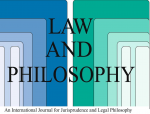This paper published in the European journal, Law and Philosophy, examines the intellectual history of inalienable rights theory, and critically examines the work of liberal philosophers of justice, John Rawls and Robert Nozick, from that perspective.
Introduction to Property Theory
This is yet another unpublished paper to introduce property theory to various audiences, particularly economists.
The Libertarian Case for Slavery: A Note on Nozick
This is a historically important paper, by one “J. Philmore,” arguing along with Robert Nozick from a free-market libertarian viewpoint that the self-sale contract and the current employment or self-rental contract are on the same moral footing.
The Market Mechanism of Appropriation
This is a non-mathematical treatment of the fundamental theorem about the laissez faire mechanism for property appropriation.
Hume Implies Locke: Fundamental Theorem of Property Theory
The fundamental theorem for the invisible hand mechanism in the property system is that if Hume’s conditions are satisfied, then the invisible judge imputes in accordance with the Lockean responsibility principle. The paper mathematically formulates and proves the theorem using vector flows on graphs.
The Two Institutional Logics
This paper, published in a Korean English-language journal, argued for the logic of commitment in the design of a firm rather than the logic of exit. The contrasts between these two logics is explored in many fields.
Harvard Business School Case: Mondragon
This is a reprint of Case No. 1-384-270. Harvard Business School 1984. It gives an overall view of the Mondragon cooperative movement of the Basque country in northern Spain as it was in the early 1980s.
Who Pays for ESOP Shares?
This is an old paper (1980s) analyzing the American Employee Stock Ownership Plan or ESOP. The original proposer of the ESOP idea, Louis Kelso, and his ardent follows have shrouded the ESOP transactions in such a cloud of rhetoric, that one needs to independently perform an analysis to see what is really going on. The paper was never published (except in this website version) since I had no reason to publicly attack ESOPs, only to be clear about them and their true institutional contribution–which is considerable.
Mixing Truth & Power: A Guest Editorial
After the dissent-motivated departures of Joseph Stiglitz, Ravi Kanbur, and now Bill Easterly, even “the most casual observer” can begin to “connect the dots” and see that the Bank is having a problem handling dissent and criticism coming from internal sources. This editorial in the World Bank Staff Association Newsletter traces the problem to the organizational stance of taking “Official Views” on the complex questions of development–thereby mixing power and truth to the detriment of the latter.






